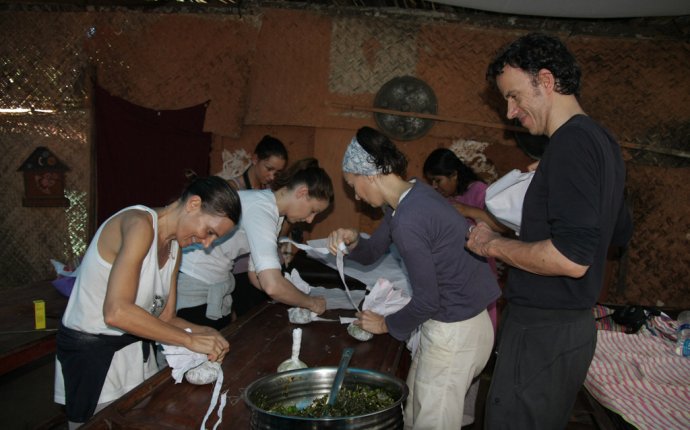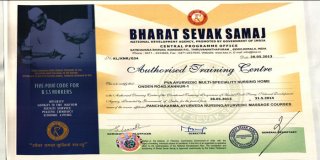
Ayurveda Certification India
PVA SCHOOL OF AYURVEDIC MASSAGE & PANCHAKARMA THERAPY

Dedicated to teaching Authentic Ayurvedic programs in Kerala, India. We offer different certification programs which are available through our in class room centers or through distance learning. Our mission is to integrate traditional Ayurvedic wisdom and healing with scientific research. With our one-month training program you will be able to practice most of the Ayurvedic massages and Panchakarma Procedures. If you are interested and have enough time to spend, there are some other advanced courses also. Here we are conducting NINE (9) different training programs in Ayurveda at this center.
Syllabus Introduction of Ayurveda, History of Ayurveda Fundamentals of Ayurveda – Basic fundamental principles Tridosha Concept Pancha Mahabhootha concept Practicals Udhwarthana (Powder massage with medicinal powders)weight reducing treatment Cosmetology 100 % Herbal Facial Face Massage Head Massage Foot Massage (Padabhyanga)1. Introduction of Ayurveda, History of Ayurveda.
2. Fundamentals of Ayurveda – basic fundamental principles.
Theory
Tridosha concept Pancha Mahabhootha concept Sapta Dhatu Agni Rasa Mala Srotas Koshta Practicals Abhyanga (Oil massage) Udhwarthana (Powder massage with medicinal powders) Dhara Kalari Marma massage Cosmetology 100% herbal facial Face massage Head massage Foot massage (padabhyanga) 1. Introduction.2. History of Ayurveda.
3. Fundamentals of Ayurveda – basic fundamental principles like Tridosha concept, Panchamahabhutha concept, concept of Dhatu, Agni etc.
4. Basic principles of Panchakarma – (Vamana, Virechana, Nasya, Vasti and Rakthamoksha), preparations of medicines needed for each process, their procedure and their application according to the nature of the disease.5. Philosophical theories of Ayurveda.
6. Concept of body mind and soul.
7. Dinacharya (routine activities according to Ayurveda), Rthcharya, Rathricharya.
8. Types of Ayurvedic massages : Procedures of different massages like Elakizhi (bolus bag massage with medicinal leaves), Navara kizhi (bolus bag massage with medicinal rice), Abhyanga (Oil massage), Pizhichil (Oil bath), Podikizhi (bolus bag massage with medicinal powder), Udhwarthana (powder massage with medicinal powder), Shiro Dhara, etc.9. Marma – the vital body points and its importance.
Practicals
1. Cosmetology (100% herbal facial)
Face massage and facial Head massage (shiroabhyanga) Foot massage (padabhyanga) Udhwarthana (Powder massage with medicinal powder) 2. Kerala Specialty Massages Elakizhi (bolus bag massage with medicinal leaves) Navarakizhi (bolus bag massage with medicinal rice) Podikizhi (bolus bag massage with medicinal powder) Abhyanga (oil massage) Pizhichil (oil bath) Shirodhara (Thailadhara, Ksheeradhara) Pregnancy massage and baby massage Traditional Kalari Marma massage Table massage Treatments Nasyam Tharpanam Karnapooranam Greeva Vasti, Kadi Vasti, Janu Vasti 1. BHAISHAJYA KALPANA: (Pharmacology) Introduction History of bhaisajya kalpana Dravya and its classifications Ausdham (medicine) and its classifications Adharabhuta siddhantas of bhaisajya kalpana (basic principles of Ayurvedic pharmaceutics) Anukta and visesokta Dravya grahana Paribhasa Ausadha kalpana Rasa, virya, vipaka, karma, and prabhava Bhaisajya marga Matra Anupana Ausadhasevana kala Saviryata avadhi Ausadha namakarana Ausadha samraksara vidhi, (storage of medicines) Dravya sangrahana (collection of herbs) 2. DRAVYA GUNA: (Herbology) Introduction Detail study of 80 herbs Family Botanical name English name Morphology Qualities Functions Indications Parts used Dosage Preparations Practicals Swarasa kalpana (juice expressed) Kalka (paste form) Phanta (hot infusion) Panaka (drinks) Churna (powder) Kwatha (decoctions) Arka (distillation) Sandhana kalpana (alcoholic preparations) Sneha and taila kalpana (medicated ghee and oil preparation) Vasti kalpana (preparation of enema medicine) Visha dravya Shodhana (poison purification) Avalehya (confectionary preparation) Vati (tablets) Netra, Mukha, nasika and dhumapana kalpana Takra and gritha from milk (medical purpose) Syllabus Introduction Swasthapursha Lakshana (qualities of healthy person) Quadruples of treatment (qualities of patient, doctor, etc.) Cause of all diseases Cause to get diseases Roga Anutpadaneeyam (chapters on natural urges) Symptoms caused by suppression of urges Treatments for symptom produced by the suppression of urges Janapadodwamsaneeyam (causes of epidemic diseases) Ashta nindhitheeyam (8 types of undesirable constitution) Shadkriya kalam (six stages of disease development) Pancha Nidana (five aetiological factors) Roga vijnanam (origin of diseases) Examination of patients Chathur vidha pramanas (4 fold principles) Ashta vidha pariksha (8 fold principles) Trividha parikshathrough (3 fold principles) Trividha bala (3 types of strength) Trividha oushadam (3 types of therapy) Nidra (theory of sleep, merits and demerits) Swapna (theory of dreams) Speciality of dreams (favourable and unfavourable dreams) Shakuna lakshana (pleasant and unpleasant signs) Treatment for Disorders Diseases of digestive system Diseases of respiratory system Diseases of skeletal system Diseases of circulatory system Diseases of nervous system Diseases of metabolic system Diseases of skin and hair Diseases of females Diseases of eyes Special diseases Detail study and care of pregnant lady Care taken and customs followed for a new bornDistance Learning Programme
We are also conducting distant learning program in Ayurvedic Massage and Panchakarma Therapy through e-mail. Students who join this course will get their lessons in Ayurveda through e-mail / post depending on their choice.
This course is of six months duration and is divided into six modules. Each module is again subdivided into 2 parts. Students will get one part each in two weeks internal. At the end of each module there will be a set of questions to work out.
After finishing the six modules, the students will have to submit a paper on the subject of Ayurveda. This unique course is designed in such a way to give a thorough understanding of Ayurveda in about six months. Once the course is complete, the students can also undergo a 10 days practical training at our hospital in different types of Ayurvedic massages at any time depending on their convenience.
If the student wants to continue his / her practice for more time they can do it with a nominal fee. There will be a dedicated Ayurvedic doctors to clear the doubts of the students through e-mail. A detail of the syllabus is along with this mail.
Note: Correspondence course syllabus is same as one month regular course.
| YEAR OF 2015 | |||||
| Jan. | 1st | Feb | 2nd | Mar | |
| Apr | May | Jun | 3st | ||
| Jul | Aug | 3rd | Sep | ||
| Oct | Nov | Dec | |||
| YEAR OF 2016 | |||||
| 1st
|
|||||
| CLASS DETAILS | |
| COURSE | CLASS TIMING |
| 1. 1week course- Ayurvedic cosmetology | 10:30 am to 12.30pm & 2pm to 4pm, Saturday and Sunday no classes |
| 2. 2week course Traditional Ayurvedic massages Ayurvedic cosmetology | 10:30am to 12.30pm & 2pm to 4pm, Saturday and Sunday no classes |














